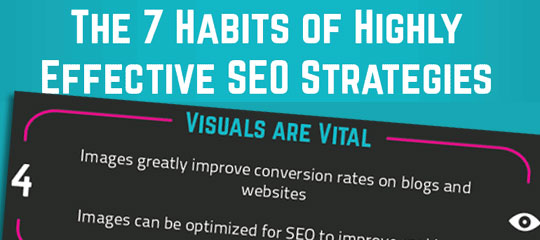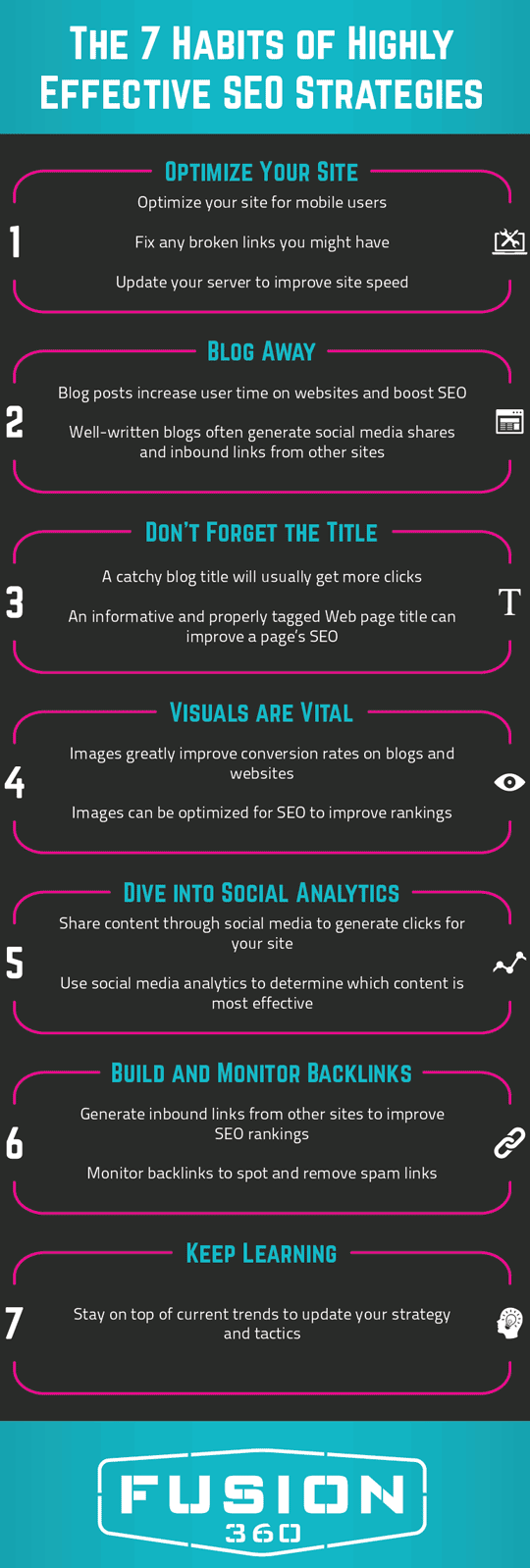
Anyone who wants to be successful online knows that SEO is a major part of any marketing plan. But knowing how to handle SEO can be tricky business, especially when the Web (and the search engines that dominate digital marketing) is constantly changing. Talk to an SEO expert, it could prove beneficial for you.
However, one thing seems to remain consistent: The combination of web design and content marketing plays a vital role in whether or not a business thrives or dies.
To help ensure that you end up in the “thrives” category, here are seven habits of highly effective SEO strategies that can help ensure success.
1. Optimize Your Site
Google is constantly updating its search algorithms to better deliver the most relevant and useful results to its users. The search engine giant’s recent mobile-friendly update (or “Mobilegeddon” as some called it) effectively removed any Websites that weren’t deemed “mobile-friendly” from all search results made by mobile users. Web developers were left with the choice to either update their site or watch mobile traffic disappear.
But there’s more to making a site Google-friendly than optimizing for mobile. Other issues, such as broken links and long load times, can also damage one’s search rankings. Tracking down and fixing such links and updating the server that is hosting your site can help resolve these issues.
2. Blog Away
Content marketing continues to play an important role in the world of SEO. And while the thought of content marketing may leave some shaking with memories of poorly-written “articles” that could have been produced by a class of first graders, many forget that establishing a properly maintained blog is a valuable piece of content marketing that can greatly boost a Website’s SEO success.
Including a blog on a company Website does much more than add another possible link to be found in a Google search. Research has suggested that an increasing number of consumers prefer reading written content (rather than watching traditional advertisements) in order to better understand a company or product.
Quality blog content also generates inbound links from other sites, especially when content begins to circulate online through social sharing.
3. Don’t Forget The Title!
When it comes to Web content, we are inundated with an overwhelming number of articles and websites clamoring for our attention each and every day. But which ones actually grab your attention? Chances are, they’re the posts that have an intriguing title; ones that seem to offer valuable information.
The same idea applies for naming a page on a Website, though flashy title may not always be necessary. The title tag is extremely important in determining how a particular page will show up in search engine results.
Title tags for Web pages should not be over 70 characters long, include keywords (without resorting to keyword stuffing), and of course, word it in a way that an actual human would understand.
[Note from Editor: For great, optimised headlines you can use CoSchedule’s Headline Studio.
4. Visuals Are Vital
Incorporating visuals is extremely important for improving a site’s SEO and for developing quality content marketing. As Samuel Edwards of the SEM Post noted,
“Regardless of how good the writing itself is, you’ll miss out on almost all conversions without an image, graphic, or video to go with it. Large blocks of text intimidate people and words aren’t nearly as effective as compelling visuals.”
Of course, images also need to be optimized for search engines. Images should not be too large, or they risk slowing down a page’s loading speed. Even the way an image is named can impact SEO (hint: give it a name that accurately describes the picture).
When properly utilized, infographics and videos can also improve a site’s search rankings. Using SEO-optimized images and videos embedded from YouTube helps keep users on a page for a longer period of time, indicating to Google that the site contains valuable, useful information.
5. Dive Into Social Analytics
Social media can be a powerful tool for increasing a company’s presence online. And it can be a great contributor to boosting SEO—particularly from a content marketing perspective, as sharing blog posts and other content marketing materials through social media can generate plenty of new clicks.
But there’s more to effectively using social media for SEO than simply posting a link. Previously mentioned points, such as using an engaging title and high-quality visual come into play here as well. Creating a description to accompany the post also ups the possibility of hooking a social media audience and generating clicks.
Social media also offers a great opportunity to analyze blogs and other content marketing materials to determine what is most effective. Facebook’s Page Insights and Twitter’s Analytics features both provide detailed information as to how many likes, shares, comments and clicks were generated by each post. Looking at what worked (or didn’t work) with different social media posts can help you refine your content to craft more effective and shareable materials for the future.
6. Build And Monitor Backlinks
Backlinks, or inbound links, are the building blocks of becoming a high-ranking site. Search engines regularly take a look at backlinks to determine a site’s popularity, which is why getting inbound links from a wide range of high-quality sites across the Web can ultimately become the biggest factor into whether or not a company’s SEO efforts succeed.
It’s clear that not all links are created equal. A link from Time will carry more weight than a user-submitted post on Medium that doesn’t get any views. And of course, a link coming from a spam source (a Black Hat tactic sometimes used to hurt competitors) will ultimately cause more harm than good. Content marketing frequently comes into play here in an effort to build inbound links across the Web.
For this it is important to consistently monitor what links are coming to your site to both refine strategies for cultivating high-quality backlinks as well as remove spam links that can damage SEO.
7. Keep Learning
The work is never truly complete in the world of SEO. Search engine algorithms are frequently adapting, and competitors are always attempting to implement new strategies to further improve their own rankings. For any SEO professional, it’s always important to keep learning, both from first-hand experience and from experts in the field.
This Infographic, provided by SEO agency Fusion 360 sums up some of the key points of this article.

[Infographic by SEO agency Fusion 360]
[Recommended reading: 4 Ways To Boost Your Website Traffic]
Kevin Johnson works at Fusion 360, a Utah-based SEO and content marketing agency. When not writing or otherwise working, he’s probably enjoying Utah’s mountains or writing music in his comedy rap band.
